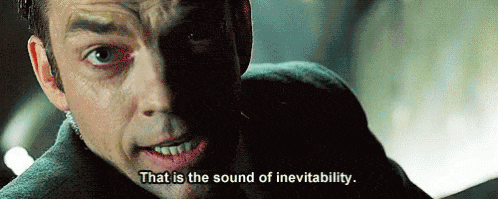It might surprise anyone who has taken the time to notice that most of my blog entries are The Friday 10 and the occasional quick takes on my latest Letterboxd views, but I love writing. I always have from the moment I learned how. I have vivid memories of sitting down at my family’s Mac 512k and banging away in MacWrite when I was as young as 4 (going on 5). I’ve written stageplays, short stories, radio dramas, and actually successfully made it to the end of NaNoWriMo a couple of times before the organization and its event self-immolated by deciding generative AI was perfectly fine with them while in the midst of accusations that they had allowed their community to become toxic.
The generative AI decision, in particular, still baffles me. In previous years, NaNoWriMo had fielded questions about potential “loopholes” in their rules, such as “What if I just upload a document with the same word 50,000 times?” and “What if I just slap the keyboard and fill my document with absolute gibberish?” And every time, their answer boiled down to the same thing: You can. Nobody will check your work — this event is all about encouraging people to be creative. But you aren’t actually winning anything, and you’ll have to live with the knowledge that you did all of this to impress a completely neutral software-based word counter.
When it came to people asking if they could use ChatGPT to write their NaNoWriMo entries, all they had to do was say exactly what they had always said. That their event was intended to be about sparking creativity, that it had no actual prize and no actual judging of the novel beyond the word count, and that you could totally do it — but you would always know the writing was done by ChatGPT and not by you.
Instead, they chose to fully embrace generative AI and rag on its detractors by arguing that refusing to accept ChatGPT and similar software as “just another writing tool” was ableist because people with handicaps need generative AI to compete with ablebodied… writers.

Irish painter and novelist Christy Brown can’t decide whether to have a few words with you or just kick your ass; but, either way, his left foot will be involved.
Coming as it did on the heels of people looking past the generative AI marketing and learning that AI is basically a plagiarism machine that drinks water by the lakeful and whose owners routinely re-open environment-unfriendly power plants solely to provide power for it, writers were understandably pissed off. And what had seemed like an absolute icon in the creativity space collapsed virtually overnight.
Despite its ability to sink seemingly any ship that tries to bring it aboard, and the fact that survey after survey suggests the public just doesn’t want it, generative AI is still being pushed on the market with alarming frequency. There’s a TikTok competitor now whose sole reason for existing is for its users to flood the platform with AI-generated videos. There are new apps springing up to replace Instagram and OnlyFans whose entire sales pitch is that they encourage the creation of AI-generated influencers. And every time you look around, there are new companies popping up to sell you ChatGPT as a friend, a lover, a therapist, or a spiritual advisor.
Those last four are most troubling to me as somebody who has studied Communications at a graduate level and who had to submit experiments to my university’s Institutional Review Board to be approved as ethical before I could even recruit people to participate in them. Every one of these corporations is running the kind of potentially traumatizing experiment that would cause a halfway-decent IRB to laugh you off of the campus, and not only are they turning it loose on all of humanity, but they’re charging people for the privilege.
Which brings me, in a round-about way, all the way back to that 4- (going on 5-)year old kid banging away at what now seems like a very small, very clunky keyboard. The kid who would later inherit a beat-up, barely-working portable typewriter and feed continuous fan-folded paper through it because we had a ton of it still sitting around from our old dot matrix printer. The kid who would eventually go to college and spend his weekends printing out scripts for his coming week’s table reads and for his weekly radio show (“Silhouette Theatre of the Ear,” an occasional feature on the weekly “Silhouette Style” show if any Hokies remember).
Because even as earning a living has made it harder and harder for me to find time to write, I still love writing. Yet every single word processor I open seems determined to take that part of the process away from me by pushing new, generative AI models as “handy tools.”

Handy tools for what? To take away the times I genuinely enjoy in my life and leave me with more time to fill out spreadsheets?
The most annoying part of all this is that, in their quest to paint these “tools” as inevitable, there is no choice available. I’ve turned off AI features innumerable times. I’ve told the notifications to shut up. I’ve toggled AI access off. I’ve given up using software I absolutely loved because it changed its Terms of Service to let them take everything I create and feed it into the plagiarism machine.
And every time there’s an update, some new setting has to be toggled. Some new, unasked-for feature has to be turned off. Some new company has bought the software and reversed their previous policy toward AI, and now there’s a new Terms of Service I have to read and reject.

Which is why, years after most of humanity (including me) thought they had stopped being relevant, I’ve bought a manual typewriter.
The pictured manual typewriter, to be specific. That picture’s from the Etsy listing at Lazy Dog Typewriters (who are not sponsors of mine, nor is that an affiliate link) because I haven’t had the opportunity to unpack it yet. But I know it’s sitting there, waiting for me to start writing a new manuscript as soon as it’s set up. And I can be assured that it won’t ask me if I want to use its new ChatGPT integration when I do.
Featured Photo by Aaron Burden on Unsplash
